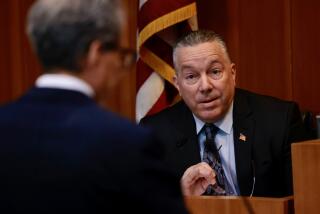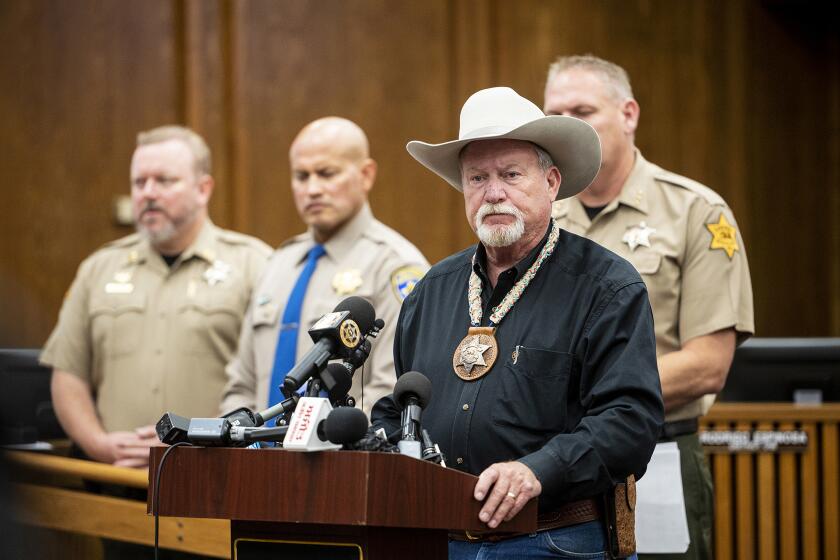Candidates for L.A. County sheriff sharpen attacks at second debate
The candidates for Los Angeles County sheriff sharpened their attacks Wednesday night, accusing each other of mismanagement and opportunism in front of a Van Nuys audience gathered for their second debate.
Unlike the debate last month, this time the candidates directed multiple barbs at the men sitting beside them, some veiled and some not.
Assistant Sheriff Jim Hellmold, one of two candidates former Sheriff Lee Baca tapped to run, called out former Cmdr. Bob Olmsted more than once. Before retiring, Olmsted oversaw the department’s most troubled jails. He has described himself as a whistle blower who tried to alert top brass about inmate abuse and aggressive deputy “gangs” but was ignored.
“What we need is a leader who’s not ignored within the organization,” Hellmold said. “You either ignored gang activity … or you were totally ineffective.”
At another point, Hellmold seemed to make a veiled attack at the two candidates in the race who come from outside law enforcement agencies: “When I see troubles at other organizations, I don’t see opportunities for myself.”
Long Beach Police Chief Jim McDonnell, who has the longest list of big-name endorsements so far, deflected that criticism, saying he had experience reforming police forces and could do the same at the Sheriff’s Department. He cited his work fixing problems at the LAPD after the Rampart corruption scandal, and making improvements within the Long Beach Police Department when he took over there.
“I have dealt with being an outsider before,” he said.
McDonnell, widely considered to be a front-runner in the race, mostly kept a cordial tone, at one point even describing his opponents as his “partners.” But he was a target for the other candidates, who brought up officer-involved shootings and racially disparate policing, concerns that have surfaced in Long Beach.
Many of the candidates promised to improve the department’s hiring standards. A Times investigation last year found that the agency gave jobs to dozens of officers who had histories of serious misconduct, including some who were friends or relatives of sheriff’s officials.
Former Undersheriff Paul Tanaka said the agency had to hire only “the very best of what society has to offer.”
“If you compromise that, you can rest assured there will be problems,” Tanaka said.
Tanaka had the most vocal supporters in the crowd, including many wearing his campaign T-shirts. The former undersheriff, ousted by Baca amid allegations of mismanagement, presented himself in a way that contrasted with how he has been portrayed by colleagues and a county blue ribbon commission.
In one instance, he told Wednesday’s audience that he had a proven track record of being responsive to civilian oversight. But while testifying in 2012 before the county commission that examined problems with jail abuse, even he acknowledged that he and others had shortcomings in implementing the reforms suggested by the department’s civilian monitors.
Tanaka also said that he chose to retire from the department so he could run for sheriff, but in an interview with The Times soon after his retirement, he said he was pushed out by Baca.
All of the candidates agreed that stronger civilian oversight was needed for the department. But Patrick Gomez, a retired lieutenant who has twice run for sheriff and lost, strayed from his opponents in saying he did not support the newly created inspector general tasked with monitoring the agency, saying the role came with no real authority.
“He cannot do anything, so that’s a waste of taxpayer dollars,” Gomez said.
All of the candidates also acknowledged that the chronic problem of jail overcrowding had to be addressed.
Los Angeles Police Det. Lou Vince pointed out that a large number of inmates inside the jails have not been convicted of any crimes and are there only because they can’t afford to make bail. He suggested a new system that would reduce the number of low-risk inmates taking up jail beds.
Assistant Sheriff Todd Rogers did not participate in the debate.
The candidates’ first debate last month was closed to the public and hosted by the rank-and-file deputies union. In a recording of that event obtained by The Times, the candidates acknowledged that the department must be reformed, but blamed management for the problems plaguing the agency.
They mostly took a diplomatic tone with the deputies in attendance, and at times served up the kind of red meat not often heard in front of general audiences. At that forum, Tanaka criticized the department’s inmate education program, saying, “Deputies should not be teaching inmates how to read while they should be manning security posts, OK?” to loud cheers from the rank-and-file.
The remark drew criticisms from his opponents, who accused him of being insensitive toward inmates and misinformed about the positive effect education has on recidivism. In a statement afterward, he took a more cordial tone, saying he wasn’t opposed to educating inmates “as long as it does not take away from the limited resources, which are needed to run the jails and protect the public.”
This year marks the first sheriff’s election in recent memory without an incumbent on the ballot. Earlier this year, Baca, who had been sheriff for four terms and was preparing to run for a fifth, abruptly stepped down amid a string of scandals and was replaced by an interim sheriff.
In the weeks before he stepped down, Baca saw 18 of his deputies charged by federal prosecutors, and his subordinates admitted that his department hired dozens of officers with histories of serious misconduct.
At least two more debates are scheduled before June, when voters will go to the polls to decide on Baca’s permanent replacement. A runoff election is possible in November if no candidate gets a majority of the votes.
ALSO:
4.6 earthquake strikes Central California
High lead levels have Eastside family living in fear
Navy ship nearly crosses paths with migrating gray whales
Twitter: RobertFaturechi
More to Read
Start your day right
Sign up for Essential California for news, features and recommendations from the L.A. Times and beyond in your inbox six days a week.
You may occasionally receive promotional content from the Los Angeles Times.







